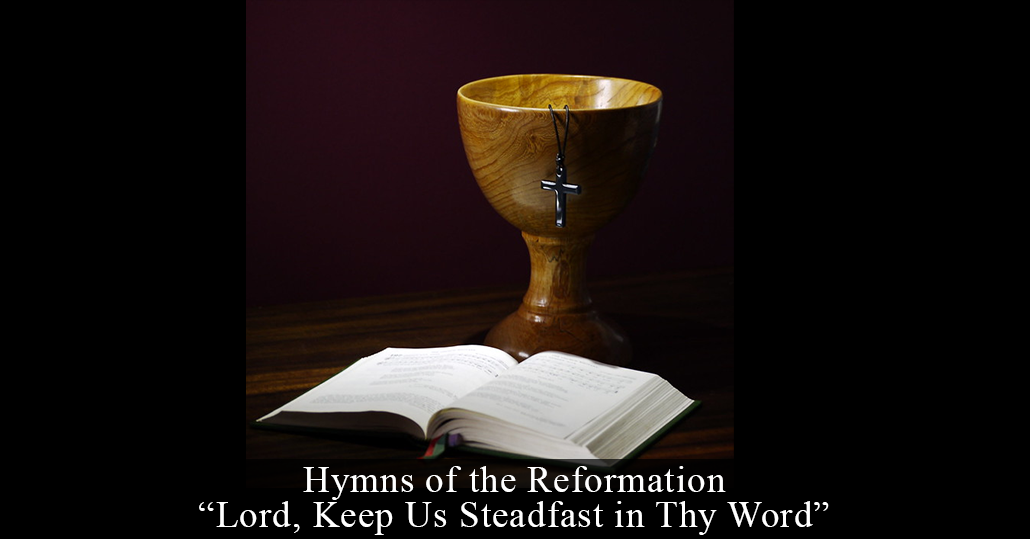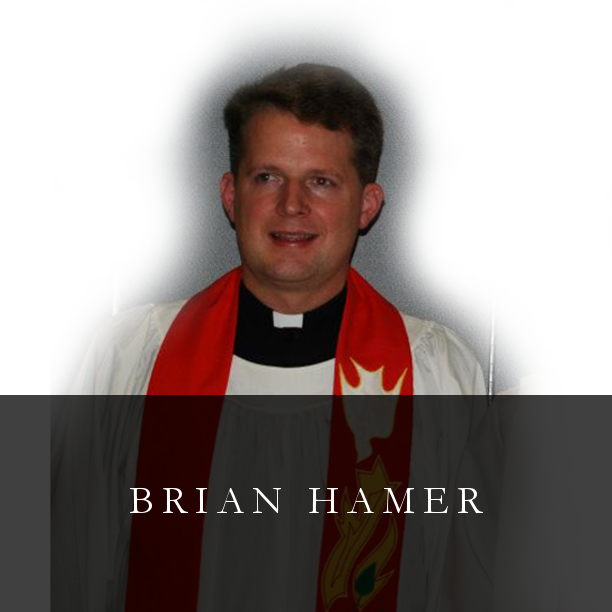Thus surrounded by dangers, Luther was also inspired to write the hymn “Erhalt uns, Herr, bei deinem Wort.” Published in Joseph Klug’s Wittenberg Hymnal (1544), the heading designates it as “A children’s hymn to sing against the two archenemies of Christ and his Holy Church: the pope and the Turks” (Ein Kinderlied zu singen wider den zween Ertzfeinde Christi und seinen heiligen Kirchen, den Bapst und die Türcken). Scholars believe that Luther also composed the melody, known by the same title, Erhalt uns Herr. The following video of one movement of J. S. Bach’s cantata based on this hymn shows artwork from the sixteenth century that highlights Luther’s opponents and contextualizes this hymn as an imprecatory hymn against the enemies of Christ and His church.
Und stewr des Bapsts und Türken Mord. and curb the murderous Pope and Turk
Die Jhesum Christum, deinen Son, who Jesus Christ, Thy Son
Wolten stürzen von deinem Thron. would thrust down from Thy throne.
Beweis dein Macht, Herr Jhesu Christ, Show forth Thy might, Lord Jesus Christ;
Der du Herr aller Herren bist; for Thou art Lord of all Lords.
Beschirm dein arme Christenheit Protect Thine own poor Christendom,
Das sie dich lob in Ewigkeit! that it may praise Thee without end.
Gott heilger Geist, du Tröster werd, God, Holy Ghost, priceless Comforter,
Gib deim Volck einrley sinn auff Erd. give Thy people one mind on earth.
Sthe bey uns in der letzten Not. Stay with us in our final strife.
Gleit uns ins Leben aus dem Todt! Lead us out of death into life.
Over the years, the hymn was frequently expanded with more stanzas. Justus Jonas (a colleague of Luther in Wittenberg), added two, condemning the Council of Trent (1545-1563), which produced the Catholic response to Luther’s Reformation. The text was: “Destroy their onslaughts, Lord / and let them meet the same evil fate / let them fall into the snare / which for Thy Christians they prepare. // So that they may perceive / That Thou, our God, livest still, / And dost deliver mightily Thy flock / that dost put their trust in Thee.” (Jhr Anschleg, HERR, zu nichten mach / lass sie treffen die böse sach / Vnd stürtz sie in die gruben ein / die sie machen den Christen dein. // So werden sie erkennen doch / dass du, vnser Gott, lebest noch, / Vnd hilffst gewaltigk deiner schar / die sich auff dich verlasset gar.)
The late 16th century brought about a third enemy for the list: the Calvinists. One version rendered the hymn as “Lord keep us steadfast in pure doctrine, a defense against the pope and Calvinist” (Erhalt uns Herr, bei reinem Lehr, dem Pabst und Calvinisten Wehr). Around 1590 an anonymous hymn to be sung to Luther’s melody parodied its first stanza as: “Lord keep us steadfast in thy Word / and curb the murderous Calvinist” (Erhalt uns Herr, bei deinem Wort, und steur des Calvinisten Mord). Probably published in Dresden, this hymn extended, as one writer noted, to a “staggering” 79 stanzas. Finally, the Catholic Church, which had lost many members to Lutheranism, blamed the enticing music of the new hymnody. Rather than produce their own catchy tunes, they adapted many Lutheran hymns for their own use. Where to find them? They just took them from published Lutheran collections. By tweaking a few words, they cleverly converted Lutheran texts into Catholic doctrine. To compile his hymnal Geistliche Lieder und Psalmen (1567), priest Johann Leisentritt borrowed from the Babstisches Gesangbuch (1545), the last hymnal for which Luther contributed a preface. In Leisentritt’s version, Erhalt uns Herr bey deinem Wort became “Lord, keep us steadfast by thy church, / protect us from all teachings of sects / thy church is one undivided / by thy cloak we know thee.” (Bey deiner Kirch erhalt uns Herr / behüt uns vor allr secten lehr / dein Kirch ist einig unzertrent / Bey deinem Rock man sie erkent.) Along the way, Catholic versifiers also found ways to parody this popular hymn. From the early 18th century we have Erhalt uns Herr, bey deiner Wurst, sechs Maas die löschen einen den Durst (Lord keep us steadfast by thy sausage, six pints, they quench one’s thirst).
The last word, however, belongs to Luther, who always expected the devil’s tricks. The following poem appeared in the preface to the Klug hymnal (1543); it was reprinted on the title page of the Babstisches Gesangbuch:
| | Viel falscher Meister itzt Lieder tichten Sihe dich für und lern sie recht richten Wo Gott hinbawet sein Kirch und sein Wort Da will der Teufel sein mit trug und mord. Many false masters now songs concoct Take care and learn to judge them right Where God doth build his church and Word There will the devil be with deceit and murder. |
Redeemer Lutheran Church
Bayside, New York
Professor Emeritus in Music
Rider University
Note: This article makes use of material from the chapter “Erhalt uns, Herr, bei deinem Wort” in Robin A. Leaver, Luther’s Liturgical Music and the entry “Lord, keep us steadfast in Your Word” in Joseph Herl, Peter C. Reske, and Jon D. Vieker, Lutheran Service Book: Companion to the Hymns, Volume 1.



 RSS Feed
RSS Feed
